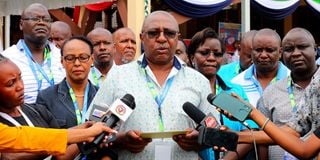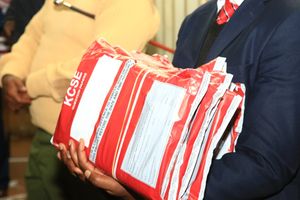Breaking News: Former Lugari MP Cyrus Jirongo dies in a road crash

Kenya Secondary Schools Heads Association (Kessha) boss Willy Kuria addressing the press during a past conference in Mombasa.
A month to the Kenya Certificate of Secondary Education exam, school heads have recommended measures to curb cheating such as limiting mobile use and shuffling invigilators.
The Kenya Secondary School Heads Association (Kessha) has proposed enhanced security and monitoring measures during the tests that have always been used to determine their promotions.
The principals want the government to jam mobile signals to prevent communication during exams. “Rotating invigilators will also reduce familiarity and potential collusion. Instal CCTV cameras to monitor exam halls to deter malpractice,” their report reads.
Some of the technological solutions include detectors to prevent mobile phones. For years, candidates have been nabbed with phones they use to cheat. For instance, an inquiry into the alleged malpractice during the 2022 KCSE exam revealed that students used social media platforms WhatsApp, Telegram and Facebook in the malpractice.
The principals further called for the restructuring of Knec to operate independently to ensure the sanctity of the national exams.
“Independence ensures unbiased examination processes and minimises external influence,” said Kessha officials, led by national chairman Willy Kuria.
The principals also proposed firm adherence to the law to prohibit the ranking of candidates and schools and eliminate pressure to manipulate results.
They also supported a proposal by the Teachers Service Commission (TSC) to have secondary school teachers as KCSE exam invigilators, as opposed to the current setup where the exams are mostly manned by primary school teachers.
“Secondary school teachers have a better understanding of the high school students they are managing. Secondary school teachers could be more assertive and effectively control candidates because of their regular interaction with them,” Mr Kuria said.
The principals said competition among schools might make secondary school teachers more committed to preventing cheating. The school administrators further called for policy and administrative changes, particularly the call for the TSC to stop promotions based on performance, and stop issuing letters to principals because of poor performance. “There should be a change of promotion criteria to ensure focus on holistic student development. There should be an end to political interference; shield exams from political agenda,” Mr Kuria added.
According to TSC guidelines, teacher promotions are pegged on good performance. This motivates them to engage in malpractice to achieve a mean score that would earn them promotions. Mr Kuria emphasised proper preparation by encouraging a thorough study, not shortcuts.
Ethical behaviour
“There should be a continuous assessment and a shift of focus from final exams alone. Promote integrity by instilling honesty and ethical behaviour,” he added.
However, the 10,000 principals from public schools also called for punitive measures for those found culpable for cheating, including sacking or imprisonment. They also recommended resource allocation. “Needs-Based-Funding allocates resources based on school needs, not just enrolment numbers. Ensure adequate staffing for effective candidate preparation,” Mr Kuria said.
Research conducted by the association explained how cheating erodes trust in the education system and devalues the legitimacy of qualifications.
“It undermines the integrity of the education system and has far-reaching consequences,” the report reads.
The 2022 KCSE exam was rocked by cheating allegations, with a section of top education officials suspended from overseeing the test and some arrested for offences, including uploading examination materials on social media, hours after they were administered to the candidates.
The association’s national governing council condemned exam cheating, saying irregularities have shamelessly gripped the country. “No school should bother to celebrate any results because of rampant cheating,” the council said.
Mr Kuria, who is also the Murang’a High School principal, said their research unearthed exam irregularities, with schools recording a sudden rise in the number of candidates with straight As. The Parliamentary Select Committee on Education also probed the credibility of the 2022 exams, for instance, in Nyambaria High School, where 28 candidates scored As in 2022 compared to four in 2021. The lowest grade for the class was a B minus. The school had a mean score of 10, and all the 488 candidates got direct entry to universities.
However, then Education Cabinet Secretary Ezekiel Machogu told the Julius Melly-led committee that it was not unusual or strange to have a high proportion of candidates excel in exams. The ministry said there had been a portrayal in the mainstream and social media that schools from certain counties achieved extraordinary scores.
They said the intended narrative in this portrayal had been that these counties were accorded an undue advantage for reasons that had never been stated. They stated that Kisii and Nyamira had been targeted and that one common allegation was the number of As from Kisii. However, the ministry told the committee that Kisii and Nyamira had the least number of As in Nyanza.
Mobile phones
However, the Ministry informed the committee that Kisii and Nyamira counties had the least number of Grade As in the Nyanza region.
They revealed that Siaya County had the highest number of As in Nyanza Region, with 72; while Kisumu had 59. They reported that Kisii was the second-last county in the region, with 51 As followed by Homa Bay and Migori had 62 and Nyamira was the last county with 30 As. Kiambu topped with 226As.
The ministry indicated that Knec received reports of alleged cases of cheating and other malpractices during the 2022 KCSE examination, however, the cases were dealt with appropriately and did not result in the cancellation of results.
Some of the reported irregularities included collusion, possession of unauthorised material detected during frisking of the candidates before the start of the examination and possession of mobile phones.
"Some centres reported candidates to have attempted to sneak mobile s in the examination centres during examination sessions and unauthorised possession of examination materials where 13 cases of early exposure where centre managers or supervisors opened the question papers early and attempted to share the same on social media," read the report.
There were 20 suspected cases reported during marking by the examiners. It was alleged that candidates presented similar and identical responses. The suspected cases were further investigated and the evidence did not meet the threshold that warrants the cancellation of candidates' examination results as per Knec guidelines," said the report.
This comes a few days after Education Cabinet Secretary Julius Ogamba appealed to the stakeholders to ensure a good atmosphere for schools to prepare candidates for the national exams which is scheduled for next month.
Mr Ogamba said candidates should be prepared for the Kenya Primary School Education Assessment, Kenya Intermediate Level Education Assessment and Kenya Certificate of Secondary Education Examination which are set to start at the end of the Third Term.
“I am appealing to all our stakeholders to do everything they can to ensure a good atmosphere for our schools to prepare candidates for the national assessment, and KCSE that are set to start at the end of the Third Term,” said the CS.
KCSE candidates will begin their exams on October 22, and KPSEA and KILEA on October 28.
Due to the phasing out of 8-4-4 from this year, there will be no Kenya Certificate of Primary Education candidates. The last KCPE cohort is in Form 1.
No disruptions
KPSEA is administered at Grade 6 before they transit to Junior Secondary School.
However, the results are not used to place candidates in JSS but to monitor their learning progress. Learners were assessed in five subjects including Mathematics, English, Integrated Science and Kiswahili.
The performance level is put in four categories, exceeding expectation, meeting expectation, approaching expectation and below expectation.
The National Parents Association, chairman Mr Silas Obuhatsa also urged the state to ensure there will be no disruptions during the crucial examination period.
Last year saw an improvement in the performance in KCSE, with the percentage of those meeting the minimum university entry requirements increasing from 173,345 candidates (19%) in 2022 to 210,133 candidates (22%) in 2023.










